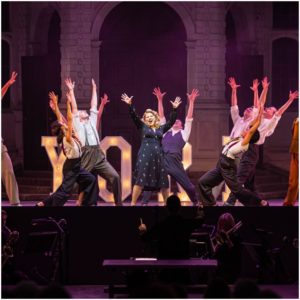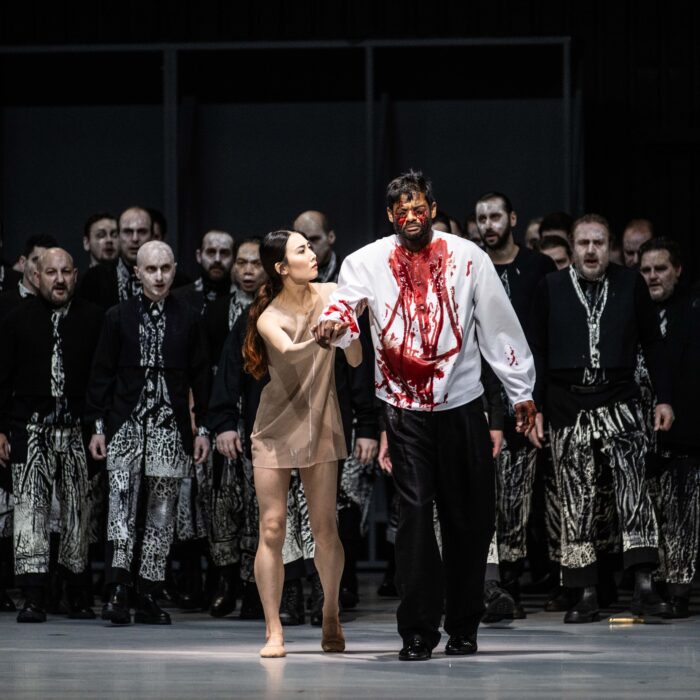
Opera Holland Park 2021 Review: Wonderful Town
A Witty & Brilliant Evening of Musical Theatre from Quick Fantastic
By Benjamin Poore(Image (c) Danny Kaan)
Opera Holland Park features several collaborations thorughout its 2021 summer season, offering much-needed work to a myriad of freelancers from across the theatre world.
Charles Court Opera will join OHP for a “Pirates of Penzance” in August; British Youth Opera will bring Rossini’s “L’occasione fa il ladro;” Waterperry Opera Festival are coming to town with a “Peter and the Wolf;” Fifth Door Ensemble will offer a chamber version of Mahler’s “Das Lied von der Erde.”
There really is something for everyone. Opera Holland Park should be lauded for the breadth of its artistic imagination and energy. There is a feeling of openness and pragmatism about the place – something echoed in the airy COVID-secured auditorium and reclaimed wood furniture from Greek designer takis. Last Thursday saw one of the first collaborations of this season – theatre company Quick Fantastic brought a new version of Leonard Berstein’s streetwise musical “Wonderful Town,” directed by Alastair Knights.
The story is a simple enough farce: Ruth and Eileen, aspiring writer and singer respectively, turn up in Greenwich Village to make their artistic and amorous fortunes; their lives intersect with various colorful characters, some more savoury than others. There are some brilliantly satiric sequences, craftily staged in this production: editor Bob Baker’s reading of Ruth’s rather schlocky manuscripts has a wonderful pantomime feel, and the Act one “Conversation Piece” is full of deftly-managed dinner party awkwardness. The show comes racing out of the blocks with a virtuosically choreographed scene-setter in the form of “Christopher Street,” full of “Candide”-esque blitheness.
It’s a show that speaks to the resilience of theatre. Bernstein wrote the score for it in just one month, hot on the heels of librettists Betty Comden and Adolph Green. The trio locked themselves in a hotel room for 30 days and threw together this lively, picaresque tale of life in Greenwich Village, which hovers between Bildungsroman and witty social satire. It was an instant hit, breaking box office records and, even more miraculously, coming in under budget. It feels an apt piece for our time. Not just in its resonant themes (bad landlords; struggling urban creatives), but also because it figures for the vibrancy and resourcefulness of the music-theatre business in a time of enormous strain.
Knights’ production is a feel-good affair; its vivacity banishes thoughts of dark times, as well it should. But perhaps a couple of creative opportunities have been missed here. Its episodic structure and moments of acidic satire – The Wreck’s song about the ludicrous inflated importance of College Football players springs to mind – evokes Brecht and Weill, and the self-awareness of the show opens some interesting thematic and political doors that this production doesn’t go through in this iteration. It’s a capricious and cynical world that we see onstage in this show; perhaps digging more deeply into it might throw some light on ours.
But this is a minor complaint. Dance sequences, choreographed by Carrie-Anne Ingrouille and lit vivaciously by Jack Weir, are seamless and spectacular, especially the Act one “Conga” finale. The latter is an apt figure for the show, whose episodic and slightly disjointed structure, derived as it is from a series of New Yorker memoirs, makes it feel more like a succession of comic tableaus rather than a fully integrated drama. But the quality of the movement and the unquenchable energy of the cast across the wide Holland Park stage keeps things ticking along nicely.
The show’s motor is doubtless the irrepressible Louise Dearman as Ruth, a sort of Figaro-meets-the Marvellous Mrs. Maisel. “One Hundred Easy Ways to Lose a Man” featured breathtaking patter and offhand comic touches; her duet with Eileen, “Ohio,” one of the show’s most famous numbers, was full of smoky lyricism. Siubhan Harrison’s Eileen made a fine foil for Ruth in the concluding “Wrong Note Rag,” though in the lower register her diction wanted definition, and she sometimes lagged behind the beat. Ako Mitchell’s Bob Baker offered velvety lyricism and tenderness throughout, but especially in “A Quiet Girl;” his characterization felt particularly well-wrought in what can just be a show of cutouts. The studied awkwardness of Roger Lipper’s Frank Lippencott, was another highlight; so too the ebullient Billy Nevers as The Wreck. The rest of the ensemble put in energetic turns, even in bit parts.
Perhaps the biggest thrills came from the pit, with Alex Parker conducting. Parker had a quicksilver feel for the score’s jerky transitions and sudden changes of speed and texture. The musicians clearly revelled in the inky, metallic depths of low brass, drums, piano, and baritone sax, evoking the rough and ready industrial feel of Bernstein’s contemporary film score to “On the Waterfront.” Woodwinds, particular clarinets, and alto sax, were lithe and sinuous. There are flashes of Bernstein’s acquisitive modernism all over the score, not least in the funky, angular saxophone and brass ensemble that feels like a nod to Stravinsky’s “Ebony Concerto,” as well as some bright, spacious harmonies.
Some of “Wonderful Town’s” dated jokes and arcane references have lost their bite. The dewy-eyed song of the Irish police officers at the beginning of the second half is also terribly trite. But the whole show really does delight – the audience, quite rightly, were on their feet at the curtain.


